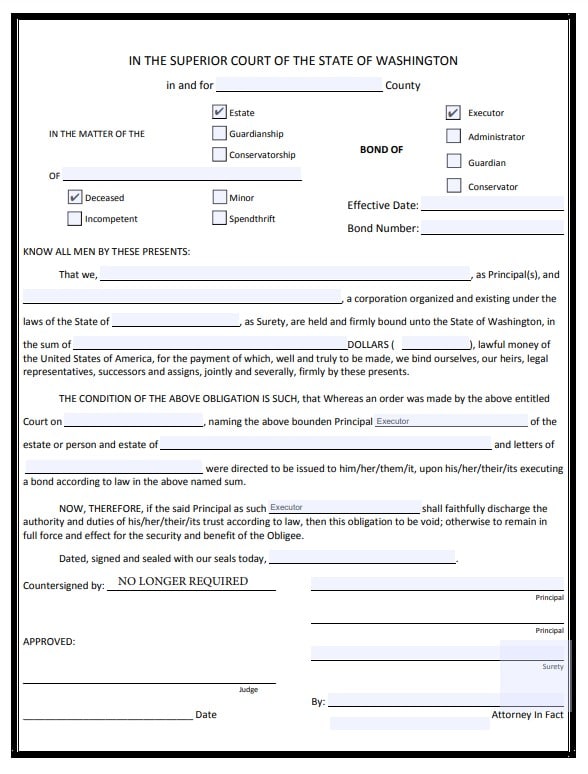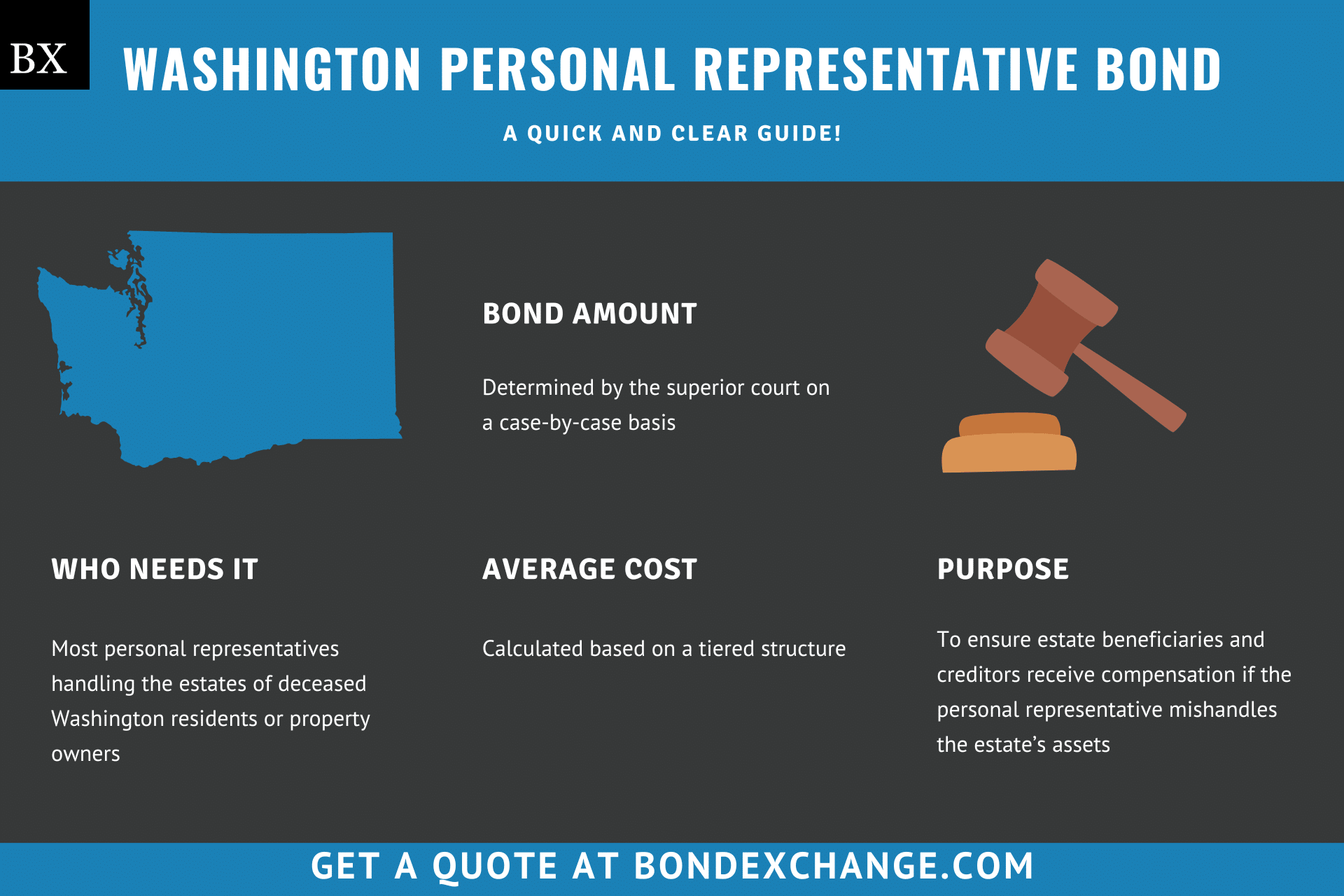Washington Personal Representative Bond: A Comprehensive Guide
This guide provides information for insurance agents to help their customers obtain a Washington Personal Representative bond.
At a Glance:
- Lowest Cost: Calculated based on a tiered structure
- Bond Amount: Determined on a case-by-case basis (more on this later)
- Who Needs it: Most personal representatives handling the estates of deceased Washington residents or property owners
- Purpose: To ensure estate beneficiaries and creditors receive compensation if the personal representative mishandles the estate’s assets
- Who Regulates Personal Representatives in Washington: The superior court of the county with jurisdiction over where the deceased individual resided or had property

Background
RCW 11.28 requires all personal representatives of an estate to be appointed by a court before assuming their fiduciary duties. The Washington legislature enacted the appointment requirement to ensure that personal representatives do not mismanage the estate’s assets. To provide financial security for the enforcement of this requirement, the court may require a personal representative to purchase a probate surety bond to be eligible for appointment.
What is the Purpose of the Washington Personal Representative Bond?
Washington requires personal representatives to purchase a surety bond as a prerequisite to being appointed as a fiduciary over an estate’s assets. The bond ensures that the estate’s beneficiaries and creditors will receive compensation for financial harm if the personal representative fails to abide by the regulations outlined in RCW 11.28.185. Specifically, the bond protects beneficiaries and creditors if the personal representative fails to adhere to all court orders or mismanages the estate’s assets. In short, the bond is a type of insurance that protects the estate’s beneficiaries and creditors if the personal representative violates their fiduciary duties.
How Can an Insurance Agent Obtain a Washington Personal Representative Surety Bond?
BondExchange makes obtaining a Washington Personal Representative bond easy. Simply login to your account and use our keyword search to find the “Probate” bond in our database. Don’t have a login? Gain access now and let us help you satisfy your customers’ needs. Our friendly underwriting staff is available by phone (800) 438-1162, email or chat from 7:30 AM to 7:00 PM EST to assist you.
At BondExchange, our 40 years of experience, leading technology, and access to markets ensures that we have the knowledge and resources to provide your clients with fast and friendly service whether obtaining quotes or issuing bonds.
Not an agent? Then let us pair you with one!

Click the above image to find a BX Agent near you
How is the Bond Amount Determined?
RCW 11.28.185 grants the superior court overseeing the probate case the authority to set the bond amount on a case-by-case basis. The court will consider factors such as the estate’s total assets and anticipated income when determining the required amount.
What are the Underwriting Requirements for the Washington Personal Representative Bond?
Most surety companies will examine the following factors when determining eligibility for the Washington Personal Representative bond:
- Personal representative’s credit history (not considered for bonds with limits less than $25,000)
- Whether or not the estate has an attorney (not considered for bonds with limits less than $25,000)
- How long the fiduciary appointment is for
- Whether or not the personal representative is replacing a prior fiduciary
- If the personal representative has ever committed a felony
- If there are disputes among the estate’s beneficiaries
- Whether or not there is any ongoing business in the estate
- If the bond is being required by a creditor
How Much Does the Washington Personal Representative Bond Cost?
Surety companies typically determine the premium rate for personal representative bonds based on a tiered structure. As a result, larger bond amounts will be charged a lower premium rate than smaller bonds.
The following table illustrates the pricing structure for the Washington Personal Representative bond:
$1,500,000 Personal Representative Bond Cost
| Bond Amount | Premium Rate | Total Bond Cost |
|---|---|---|
| First $20,000 | 0.75% | $150 |
| Next $40,000 | 0.60% | $240 |
| Next $140,000 | 0.50% | $700 |
| Next $300,000 | 0.375% | $1,125 |
| Next $1,000,000 | 0.25% | $2,500 |
| Total cost of $4,715 |
Who is Required to Purchase the Bond?
Washington requires personal representatives to purchase a surety bond as a prerequisite to obtaining a fiduciary appointment. To paraphrase RCW 11.02.005, a personal representative is a court-appointed fiduciary responsible for administering a deceased individual’s estate. Personal representatives are referred to as executors if the deceased individual selected them in their will, or administrators if they were not selected in the will or if no will exists.
Personal representatives are not required to purchase a bond if:
- The will explicitly waives the bond requirement
- They are the deceased individual’s surviving spouse or domestic partner and the entire estate will be distributed to them
- They are an authorized bank or trust company

BondExchange now offers monthly pay-as-you-go subscriptions for surety bonds. Your customers are able to purchase their bonds on a monthly basis and cancel them anytime. Learn more here.
How do Personal Representatives Become Appointed in Washington?
Personal representatives in Washington must navigate several steps to become court-appointed fiduciaries. Below are the general guidelines, but applicants should refer to Washington’s probate statutes for details on the process.
Step 1 – Meet the Qualifications
Persons are ineligible for appointment as personal representatives if any of the below characteristics apply to them:
-
- They are a minor
- They are of unsound mind
- They have been convicted of a felony or any other crime involving moral turpitude
Businesses are generally barred from acting as personal representatives unless they are a trust company, a state or national bank, or comprised solely of licensed attorneys. Non-profits are able to act as personal representatives if their articles of incorporation or bylaws permit them to.
Step 2 – Determine Priority
Priority for appointment as a personal representative will be granted in the following order:
-
- Persons nominated in the will
- The surviving spouse or domestic partner
- The deceased’s children
- The deceased’s mother or father
- The deceased’s brothers or sisters
- The deceased’s grandchildren
- The deceased’s nieces or nephews
- Any fiduciary with current control over a substantial portion of the deceased’s probate and non-probate assets
- Any beneficiaries of the deceased individual’s estate
- If the deceased individual was an inmate, the director of revenue of the institution that held them
- The secretary of the Department of Social and Health Services If the estate owes debts to a long-term care facility
- Any principal creditor of the estate
- Any other suitable person
Multiple individuals may be appointed as personal representatives.
Step 3 – Hire an Attorney
Although not explicitly required, it is highly recommended that personal representatives hire an attorney to assist with the probate process.
Step 4 – Contact the Superior Court
Persons that meet all qualifications and have priority must contact the superior court with jurisdiction over the estate to obtain their appointment. A representative of the court will walk the personal representative through the appointment process, provide them with all required forms, and answer any questions they may have. Personal representatives not explicitly nominated in the will (administrators) may have to undergo additional steps to receive their appointment.
Any person with an interest in the estate’s assets may file an objection to the appointment of the personal representative(s) and is entitled to a hearing to make their case.
Step 5 – Purchase a Surety Bond
Unless otherwise exempt, personal representatives must purchase and maintain a surety bond in an amount set by the court.
How do Washington Personal Representatives File Their Bonds?
Personal representatives should submit their completed bond forms, including the power of attorney, to the superior court with jurisdiction over the estate.
The surety bond requires signatures from both the surety company that issues the bond and the personal representative. The surety company should include the following information on the bond form:
- Court where the bond is to be filed
- Legal name of the entity/individual(s) buying the bond
- Date the bond goes into effect
- Surety company’s name
- Bond amount
- Date of appointment
- Name of the estate
- Type of letters being issued (testamentary or administration)
- Date the bond is signed
What can Washington Personal Representatives do to Avoid Claims Made Against Their Bonds?
To avoid claims against their bonds, personal representatives in Washington must ensure that they:
- Perform all of their fiduciary duties
- Obey all court orders
- Do not mismanage the estate’s assets
